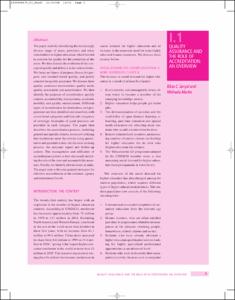Quality assurance and the role of accreditation: an overview

Visualitza/Obre
Estadístiques de LA Referencia / Recolecta
Inclou dades d'ús des de 2022
Cita com:
hdl:2099/8095
Tipus de documentArticle
Data publicació2007
EditorPalgrave MacMillan
Condicions d'accésAccés obert
Llevat que s'hi indiqui el contrari, els
continguts d'aquesta obra estan subjectes a la llicència de Creative Commons
:
Reconeixement-NoComercial-SenseObraDerivada 3.0 Espanya
Abstract
The paper starts by identifying the increasingly diverse range of users, providers and other stakeholders in higher education, which has led to concern for quality for the protection of the users. We then discuss the evolution of the concept of quality and define it in its various forms. We focus on fitness of purpose, fitness for purpose and standard-based quality, and justify concern for quality assurance. We discuss three quality assurance mechanisms: quality audit, quality assessment and accreditation. We then identify the purposes of accreditation: quality control, accountability, transparency, academic mobility and quality enhancement. Different types of accreditation for institutions and programmes are then identified and described, with seven broad categories and four sub-categories of coverage. Examples of good practices are provided in each category. The paper then describes the accreditation process, including general and specific criteria, means of verifying that institutions meet the criteria using quantitative and qualitative data, the decision-making process, the outcome report and follow-up actions. The management and affiliation of accreditation systems is then discussed, including the role of the state and accountability measures. Finally, we identify eleven issues at stake. The paper ends with some general strategies for effective accreditation at the national, agency and institutional levels.
CitacióSanyal, Bikas C; Martin, Michaela. Quality assurance and the role of accreditation: an overview. "Report: Higher Education in the World 2007: Accreditation for Quality Assurance: What is at Stake?", 2007.
ISBN0-230-00047-9
| Fitxers | Descripció | Mida | Format | Visualitza |
|---|---|---|---|---|
| bikas.pdf | 763,0Kb | Visualitza/Obre |


